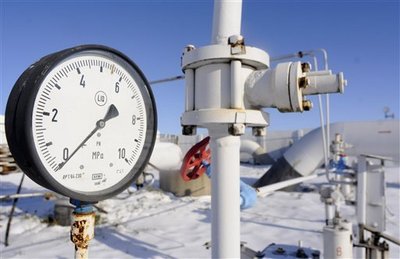
Gazprom Stops Gas Deliveries to Ukraine—What Next?
Publication: Eurasia Daily Monitor Volume: 6 Issue: 1
By:

On the morning of January 1, OAO Gazprom, the Russian state-owned gas monopoly, in league with the Russian government, decreased the volume of gas shipped to Ukraine by 90 million cubic meters a day—the amount that Ukraine had contracted for in 2008. Gas shipments of 300 million cubic meters per day for European customers, shipped via the Ukrainian trunk pipeline, were not affected at first; but on January 2 Hungary, Bulgaria, and Poland began recording drops in pipeline pressure and slight disruptions in supply, while Romania reported a gas decrease of 30 to 40 percent.
In November 2008 Gazprom announced that it would stop gas deliveries to Ukraine on January 1, 2009, unless Kyiv settled all its accounts for gas delivered in 2008, including late payment penalties. Throughout December the two sides could not reach an agreement and did not sign a contract for 2009 gas deliveries. The issues dividing the two countries were discussed in closed negotiations but with both parties resorting at the same time to public statements and threats as a means of applying pressure on each other.
Ukrainian arrears of $2.1 billion appeared to be the primary reason for the cutoff. The Ukrainian state-owned energy company Naftohaz Ukrainy claimed, however, that the money was owed to RosUkrEnergo (RUE), a Swiss-based intermediary company, 50 percent of which belongs to Gazprom and 50 percent to two Ukrainian businessmen. Gazprom insisted that the money was owed to them. On December 31, 2008, Naftohaz stated that the debt had been paid in full. Gazprom spokesman Sergey Kuprianov disputed this and claimed that the Ukrainian side still owed $614 million dollars in late charges.
RosUkrEnergo, which was made a middleman for gas supplies to Ukraine at Gazprom’s insistence in January 2006, has been the center of a continuing conflict between Ukrainian Prime Minister Yulia Tymoshenko and Gazprom. Tymoshenko has called the Swiss company a “criminal scheme” (Interfax Ukraine, December 27, 2007) and vowed to force it out of the Ukrainian market.
Gazprom’s price for gas to Ukraine in 2009 is the second major conflict between the two sides. Gazprom management has quoted several possible prices. CEO Alexei Miller said in December that Ukraine would pay $450 per 1,000 cubic meters in 2009. During the unsuccessful negotiations, Gazprom demanded $250, which the Ukrainians rejected, making a counteroffer of $208. Miller responded that since they had rejected $250, they would pay $418. On January 1 Oleh Dubyna, the head of Naftohaz Ukrainy, offered to buy Russian gas for $235 contingent on a price increase for transporting Russian gas to Europe from the current $1.70 per 1,000 cubic meters per 100 kilometers to $1.80 (RIA Novosti, January 1). Russian Prime Minister Vladimir Putin rejected this increase and insisted that transit fees were locked into a contract that is due to expire in 2010 (UNIAN press agency, January 1). The next day Ukrainian President Viktor Yushchenko and Tymoshenko made a joint public statement on the crisis in which they upped the proposed transit price to “not less than $2.00” (Ukrayinska Pravda, January 3).
Hidden behind the posturing and threats made by each side in the dispute are issues that deserve to be examined.
One of the long-standing points of contention in the Ukrainian-Russian gas trade is the use of intermediary companies such as Eural Trans Gas and its successor RosUkrEnergo. These highly lucrative opaque companies, alleged to be the brain child of former Gazprom deputy CEO Yuriy Komarov, do not own any gas fields or pipelines, yet Gazprom has insisted on their inclusion in the Ukrainian market since 2002, despite the fact that their role as intermediaries has never been clearly explained and the people involved in these schemes have admitted to ties with Russian organized crime figures. Some suspect that the money earned by RUE goes to line the pockets of high Gazprom and Kremlin officials.
The Tymoshenko faction in the Ukrainian parliament has vowed to rid the market of RosUkrEnergo, yet the company seems to enjoy the highest levels of protection in the Kremlin and, some speculate, has close relations with Yushchenko. Tymoshenko fears that Gazprom, by claiming that the Ukrainian debt has not been paid in full, is seeking a way to keep RosUkrEnergo in place. Her concerns might well be justified.
A second hidden factor is the Kremlin’s dislike for both Yushchenko and Tymoshenko and their pro-Western agenda. By cutting off gas the Kremlin might be attempting to show Ukrainians that their quarrelsome leadership is incapable of dealing with Russia on such a critical question as energy supplies. If the gas shutoff succeeds in discrediting the Tymoshenko government (Yushchenko’s approval ratings are so low that the gas situation would have no impact on him) then the pro-Russian opposition Party of Regions could find itself getting a needed boost in popularity.
The third aspect of the conflict is the struggle by the Kremlin clan for popularity among Europeans—as well as Russians. With the price of oil and gas dropping and the Russian budget predicted to have a deficit in 2009, the Kremlin would dearly love to pin the blame for its woes on Kyiv. Gazprom emissaries and Western PR companies hired by Gazprom have been ordered to explain Russia’s side of the conflict and to demonize the Ukrainian leadership, while Russian media reports continuously repeat unsubstantiated reports that Ukraine is once again stealing Russian gas.
What can happen next? The Ukrainian side has more than enough gas in storage to weather out the storm of non-supply and make the case that they are being victimized by Putin and Gazprom. Gazprom, on the other hand, stands to lose billions of dollars in potential revenue by not selling to Ukraine and placing supplies to Europe in jeopardy. If the Russian strategy is both to discredit the Tymoshenko government and to keep RUE in place, the European outcry might be loud and bitterly anti-Russian as was the case in January 2006 when Gazprom cut off gas to Ukraine for the same alleged reasons as in January 2009.




